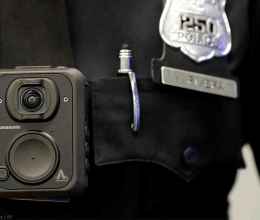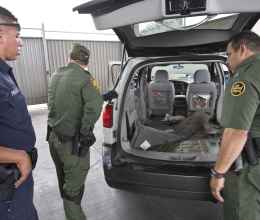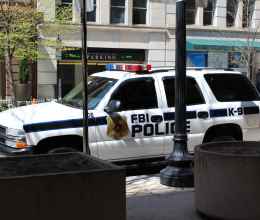This is not an isolated incident. ICE agents have repeatedly raided Kern County courthouses in recent years, rounding up residents waiting to pay fines, appear in court, get married, and even – in one case reported to the ACLU – get a domestic violence restraining order. ICE’s tactics are in tension with their own written policies, which state they will not conduct enforcement actions at “sensitive” locations. Ironically, the raids have kept people from paying tickets and attending court.
Today, the ACLU of California and the ACLU Immigrants’ Rights Project sent a letter to ICE, describing a pattern of abusive and counterproductive raids in the Bakersfield area, and calling for an end to these courthouse arrests.


Privacy statement. This embed will serve content from soundcloud.com.
Mr. Villatoro’s visit to the courthouse resulted in an immigration nightmare. Prior to his January trip to the courthouse, he had lived in the U.S. for a decade without being arrested. His detention, he believes, was based purely on his Latino appearance and the fact that he had a ticket for driving without a driver’s license. Even though ICE appears to have no valid grounds for his arrest, Mr. Villatoro now faces permanent separation from his two young children, both of whom are U.S. citizens.
Gurvinder Singh’s arrest occurred on what should have been one of the happiest days of his life.
In September 2012, Mr. Singh went to a Kern County courthouse in Bakersfield to marry Kuldeet Kaur, a lawful permanent resident. After they arrived and presented their identification, a County clerk told them to wait. Shortly thereafter, ICE agents arrived. The agents immediately arrested Mr. Singh after he stated that he entered the United States through Mexico. The problem? Mr. Singh had been in immigration proceedings since 2010, when he first sought asylum in the United States. After realizing their mistake, ICE later released Mr. Singh from detention. But officials placed Mr. Singh on electronic monitoring, and forced him to report to ICE every 15 days – even though he had never missed a court appearance.
ICE’s actions kept the couple from marrying that day. Two months later, with the help of their lawyer, they finally married at the same courthouse. In August, their first child was born.
After mistakenly selling alcohol to a minor at a convenience store, Jogmohan Singh received a citation to appear in court. He pled guilty, and the judge ordered him to take a class. While waiting to register for the class, an ICE agent arrested him, leading to a four-month detention in an immigration facility.
Mr. Singh, who has no criminal history, now faces the possibility of permanent separation from his three young children and his ill wife, all U.S. citizens. The reason? After Mr. Singh applied for asylum in 1996, a court ordered his removal in his absence after his lawyer gave him the wrong hearing date. The government refused to reopen his case. Mr. Singh is now in the U.S. on borrowed time: ICE agreed to postpone his deportation for one year so he can care for his wife, who suffers from severe diabetes.
These stories paint a portrait of a broken immigration system. They run counter to ICE’s own policy of avoiding arrests in “sensitive” locations, such as hospitals, schools, and places of worship. Courthouses should appear on this list. If residents cannot appear in court without fearing deportation, public safety will suffer.
Download the ACLU's letter to ICE
Michael Kaufman is staff attorney at ACLU of Southern California


